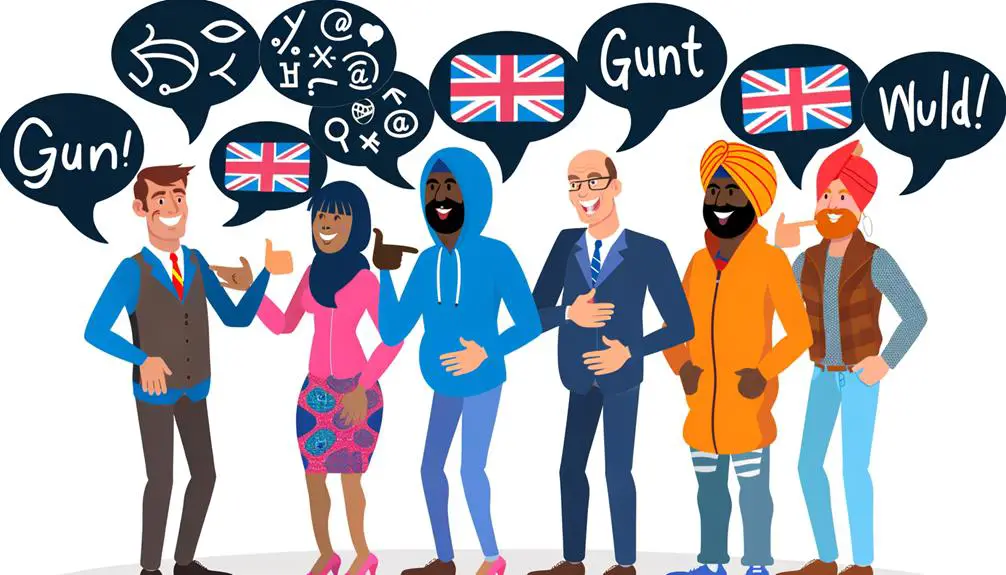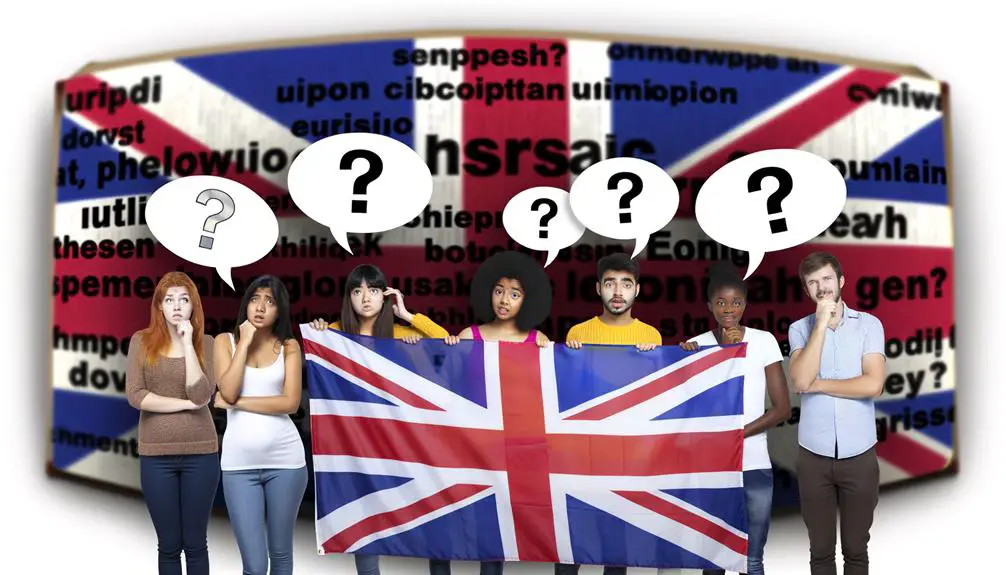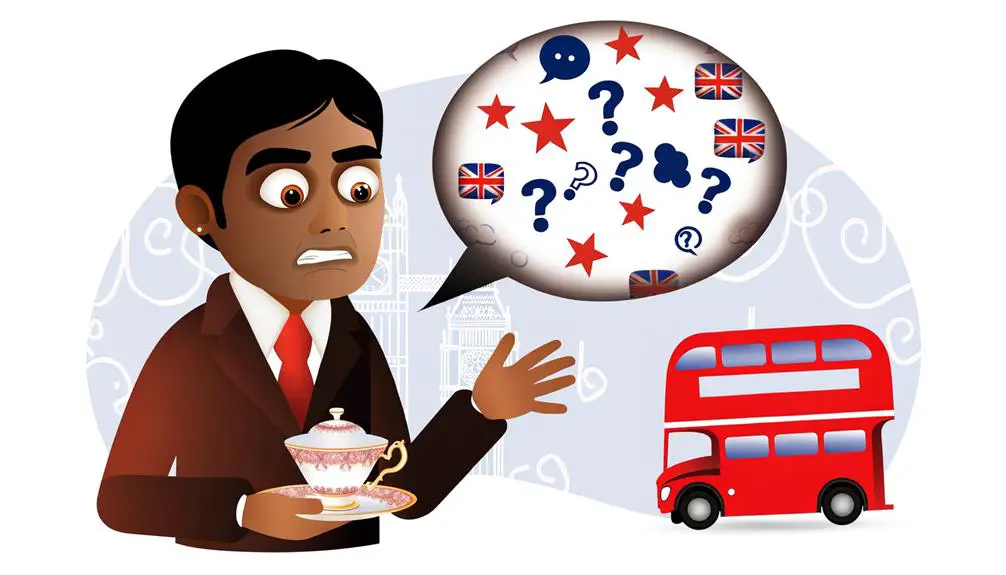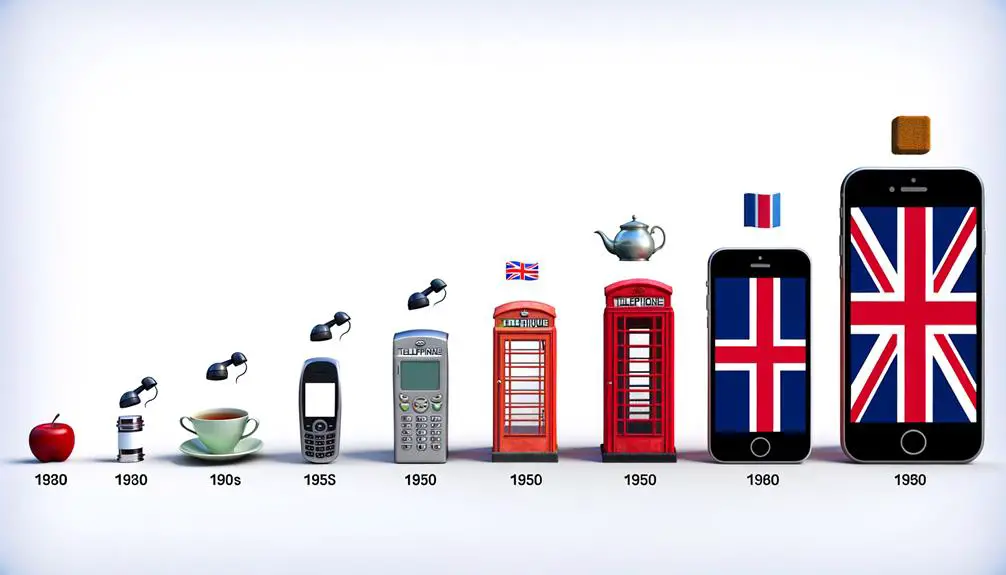In British slang, 'gunt' refers to a lower abdomen protrusion. Pronounced /ɡʌnt/, it walks a fine line between a neutral descriptor and a potentially pejorative term. Its origins and linguistic journey highlight the cultural significance of word formation through processes like blending and compounding, reflecting the dynamic nature of the English language. Beyond its basic definition, 'gunt' embodies societal attitudes toward body image, gender stereotypes, and linguistic diversity. It varies regionally in meaning due to dialectical influences, showcasing the complex fabric of British slang. An exploration into 'gunt' reveals more than just its definition; it offers insight into shifting social attitudes and language trends.
Key Takeaways
- 'Gunt' in British slang refers to a protrusion of the lower abdomen.
- It can have neutral or pejorative connotations, depending on context.
- The term reflects societal attitudes towards body image and femininity.
- Usage varies regionally, indicating dialectical influences on its interpretation.
- Appropriately using 'gunt' requires cultural sensitivity and awareness of potential impacts.
The Meaning of Gunt

The term 'gunt' in British slang refers to a specific physical attribute, typically denoting the area where the lower abdomen protrudes over the genital area, often observed in both genders. Its pronunciation, /ɡʌnt/, mirrors its blunt phonetic construction, which perhaps underscores the straightforwardness with which it identifies its particular physicality. This term, while seemingly straightforward, carries with it a range of connotations that straddle both neutral descriptions and, at times, pejorative judgments.
In examining its alternative meanings, one finds that 'gunt' can also extend beyond its primary physical descriptor to embody aspects of lifestyle or health implications indirectly suggested by the presence of a prominent lower abdominal overhang. This duality of meaning enriches the term, making it a more versatile addition to the lexicon of British slang. It is important to approach the term with an awareness of its potential implications and the context in which it is used, as it can be seen as insensitive or offensive if employed derogatorily. Analytically, the linguistic construction and usage of 'gunt' reflect broader societal attitudes towards body shape and health, making its study relevant not only in linguistics but also in cultural and social analysis.
Origins and Etymology
You'll find that tracing the origins and etymology of 'gunt' involves examining its historical root words and understanding the pathway of its evolution within slang usage. This process reveals not only the linguistic transformation over time but also the socio-cultural factors influencing its adoption and adaptation. By analyzing these aspects, you're engaging with the intricate dynamics that shape language and reflect societal changes.
Historical Root Words
Delving into the etymology of 'gunt,' one discovers a rich tapestry of linguistic evolution that underscores its cultural significance. The linguistic origins of this term are embedded in a complex interplay of word formation processes, including both compounding and blending. These processes are foundational in the creation and adaptation of slang within the English language, illustrating how new meanings are often derived from existing lexical items through innovative linguistic practices. The historical roots of 'gunt' reveal not just the mechanics of its construction but also the social and cultural contexts that necessitate such linguistic creativity. This exploration into the term's etymology highlights the dynamic nature of language, where words are continually shaped and reshaped by those who wield them.
Slang Evolution Path
Exploring the evolution of 'gunt' unveils a fascinating journey through the annals of slang, where linguistic innovation meets cultural adaptation. This term's development is a demonstration of linguistic diversity and global influences, reflecting how language morphs in response to societal changes. The table below highlights key stages in its etymology:
| Stage | Description |
|---|---|
| Origin | Coined within specific social groups, blending humor and vernacular. |
| Spread | Gained popularity through media and informal communication. |
| Adaptation | Adapted meanings and usages as it permeated different cultures. |
| Current Usage | Recognized in broader contexts, often with nuanced connotations. |
This progression exemplifies the dynamic nature of slang, showcasing how words can evolve significantly from their initial conception, influenced by the intricate interplay of culture and communication.
Gunt in British Culture
In your exploration of British culture, you'll find that the term "gunt" carries significant social implications, particularly among the youth. Its usage reflects not only linguistic creativity but also societal attitudes and values that merit close examination. Understanding how and why British youth adopt this slang can offer insights into broader cultural dynamics.
Gunts Social Implications
Understanding the social implications of the term 'gunt' within British culture requires an analysis of its nuanced usage and reception among different social groups. The term, rooted in slang, carries weighty gender implications, often reflecting and reinforcing societal attitudes towards body image and femininity. Its deployment can illuminate underlying biases, sometimes contributing to gendered stereotypes that pervade British society. Additionally, the potential for international misunderstandings cannot be overstated. For non-British audiences, unfamiliarity with the term's connotations and its cultural context may lead to misinterpretations, affecting cross-cultural communication. Such misunderstandings underscore the importance of grasping not only the linguistic but also the societal layers embedded in slang like 'gunt', highlighting its complex role in shaping and reflecting social attitudes and interactions.
Usage Among British Youth
Shifting focus to the domain of British youth, it's evident that the term 'gunt' plays a distinctive role within their cultural lexicon, reflecting broader social dynamics and attitudes. The integration of such slang into daily vernacular among teenagers and young adults signifies not only shifts in youth language trends but also highlights the rapid slang adoption rates characteristic of this demographic. This phenomenon underscores the fluidity of language and its ability to encapsulate contemporary societal and cultural nuances. As you navigate through the intricate web of British youth culture, understanding the context and usage of 'gunt' provides insight into the evolving landscape of communication. This evolution mirrors the dynamic interplay between language, identity, and social belonging, painting a vivid picture of the linguistic agility present within British youth culture.
Regional Variations
How does the meaning of 'gunt' vary across different regions of the UK, and what factors contribute to these variations? The regional variations in the meaning and usage of 'gunt' are largely attributable to dialectical influence and pronunciation differences. These elements profoundly shape the interpretation and application of slang within localized contexts, leading to a rich tapestry of meanings across the British Isles.
Dialectical influence plays a pivotal role in this variation. Different regions possess their own unique dialects, which encompass not only distinct vocabularies but also unique expressions and idiomatic phrases. Therefore, 'gunt' may carry specific connotations in one area that are entirely absent in another, influenced by the cultural and social nuances embedded within each dialect.
Pronunciation differences further exacerbate these regional disparities. The way words are pronounced can significantly alter their perceived meanings or associations, with variations in stress, intonation, and vowel sounds potentially transforming the interpretation of 'gunt' from one locality to another. These pronunciation nuances are often subtle yet critical, shaping the regional identity of slang and affecting its reception and understanding among different UK communities.
Usage and Examples

Exploring the regional variations of 'gunt' reveals a complex landscape of dialect and pronunciation, which naturally leads us to examine its practical use and illustrative examples within these communities. You'll find that gunt pronunciation plays a pivotal role in understanding its alternative meanings and applications. Depending on the region, the emphasis and tonal variation can greatly alter its interpretation, making it a multifaceted term within British slang.
In one instance, 'gunt' might be employed humorously or affectionately among peers to refer to an idiosyncratic trait or situation, showcasing its versatility beyond a mere pejorative. This adaptability is evident in conversations where context clues and vocal inflections guide the listener toward the intended meaning. For example, in a northern dialect, the term could embody a sense of camaraderie, while in southern regions, it might carry a slightly more derisive connotation.
Furthermore, the exploration of 'gunt' reveals its capacity to encapsulate complex social dynamics, such as in-group vs. out-group identification and the negotiation of social boundaries. Through careful observation of its usage across different contexts, one discerns a rich tapestry of linguistic innovation and cultural expression, underscoring the term's significance within the lexicon of British slang.
Comparisons With Other Slang
To fully appreciate the nuanced role of 'gunt' within British slang, it is important to compare it with other regional vernacular expressions, examining how these terms collectively shape the linguistic landscape of the UK. International comparisons reveal intriguing parallels and stark contrasts. In the domain of slang alternatives, each term not only reflects local culture but also embodies unique societal attitudes and values.
When juxtaposing 'gunt' with similar expressions from, say, American or Australian English, one observes a fascinating blend of convergence and divergence in slang evolution. For instance, American slang possesses its own repertoire of colloquialisms for bodily features, which, while analogous in concept, often carry different connotations or levels of acceptability. Australian slang, known for its inventiveness and penchant for abbreviation, offers another rich tapestry for comparison.
These international comparisons underscore the dynamic nature of slang, evolving in response to changing societal norms and cultural exchanges. Furthermore, they illuminate the distinctive characteristics that make British slang, with 'gunt' as a salient example, an essential component of English linguistic diversity. Analyzing slang alternatives across regions provides a deeper understanding of not only the words themselves but also the cultural contexts from which they emerge.
Public Perception and Controversy

As you explore the domain of British slang, particularly the term 'gunt,' it's important to contemplate the varied reactions on social media, which reflect a broader public sentiment. Concerns regarding cultural sensitivity underscore the contentious nature of slang within diverse communities, highlighting the delicate balance between linguistic evolution and societal values. The debate over language evolution, fueled by such terms, underscores the dynamic and often polarizing nature of slang in contemporary discourse.
Social Media Reactions
The term 'gunt' has elicited a spectrum of reactions across social media platforms, reflecting a contentious debate over its usage and implications in contemporary discourse. On one hand, celebrity endorsements have amplified its visibility, embedding it within digital vernacular and fostering a sense of in-group familiarity. These public figures, by engaging with the term, have inadvertently sanctioned its casual use, propelling it into the limelight alongside emerging hashtag trends. This phenomenon underlines the pivotal role of influencers in shaping linguistic evolution and public perception. However, the ease with which such terms gain traction online underscores the volatile nature of social media as a breeding ground for linguistic experimentation, often detached from the nuanced understanding of potential socio-cultural ramifications.
Cultural Sensitivity Concerns
Despite its popularity in certain circles, the term 'gunt' has sparked significant controversy due to cultural sensitivity concerns, prompting a closer examination of its public perception and underlying implications. The essence of the debate centers on how linguistic expressions can inadvertently perpetuate stereotypes or offend cultural sensibilities, reflecting broader issues of global understanding and linguistic diversity. In a world increasingly interconnected, yet diverse in its cultural expressions, the usage of such slang highlights the thin line between colloquial humor and potential disrespect. Analyzing this term within the context of cultural sensitivity not only underscores the complexity of global communication but also serves as a reminder of the importance of considering the broader implications of language in fostering a more inclusive and respectful international dialogue.
Language Evolution Debate
Engaging in the language evolution debate, it's crucial to understand how public perception and controversy reflect the dynamic nature of linguistic change. The discourse around language preservation versus the embrace of modern linguistics encapsulates the tension between maintaining linguistic heritage and adapting to contemporary communication needs. Public perception often swings between these poles, influenced by cultural, social, and academic controversies. On one hand, there's a strong push for preserving languages in their purest forms, viewing this as essential for cultural identity and historical accuracy. On the other, modern linguistics advocates for the natural evolution of language, arguing that adaptation and change are intrinsic to linguistic vitality. This debate underlines the complexity of language as both a static repository of culture and a living, evolving entity.
Gunt in Media and Entertainment

In examining the portrayal of British slang in media and entertainment, one observes that the term 'gunt' often encapsulates complex societal attitudes and cultural nuances. The usage of 'gunt' in television shows, movies, and online platforms can serve as a litmus test for the evolving boundaries of language acceptability and the tension between authenticity in cultural representation and the necessity for sensitivity. The controversies surrounding 'gunt' highlight the challenges content creators face when maneuvering the fine line between realistic dialogue and the potential for offending audiences.
Entertainment censorship plays a pivotal role here, as regulatory bodies and networks scrutinize the inclusion of slang that might be deemed offensive or inappropriate. The debates often revolve around the intention behind using such terms—whether they're employed to enrich character development and plot authenticity or seen as gratuitous. This scrutiny reflects broader societal concerns over language and its power to shape perceptions, reinforce stereotypes, or challenge norms. As 'gunt' continues to be dissected and debated within these public forums, it underscores the dynamic interplay between language, culture, and the ever-shifting landscape of media and entertainment.
How to Use Gunt Appropriately
Understanding how to use the term 'gunt' appropriately requires a nuanced approach to its cultural context and potential impact on various audiences. The primary consideration must be the appropriateness of contexts in which this slang is employed. It's imperative to gauge the familiarity and comfort level of the audience with British slang, as well as the setting—be it informal or a more conservative environment. Misjudging these aspects can lead to misunderstandings or even offense.
Moreover, the usage of 'gunt' should be informed by an awareness of its connotations and the potential for it to be perceived as derogatory or insensitive. In scenarios where its use might be questionable, exploring linguistic alternatives that convey your message without risking misunderstanding or offending sensibilities is advisable. This strategy underscores the importance of adaptability and sensitivity in language use, particularly with slang that carries specific cultural implications.
The Evolution of Gunt

Over time, the term 'gunt' has undergone significant evolution, reflecting changes in societal attitudes and linguistic practices. This transformation is marked by global influences and an increasing recognition of linguistic diversity, illustrating how language is a dynamic and evolving entity.
| Era | Societal Attitudes | Linguistic Impact |
|---|---|---|
| 20th Century | Stigmatization | Limited use, negative connotations |
| Early 21st Century | Shift towards neutrality | Broader acceptance, varied contexts |
| Present Day | Increased awareness | Emphasis on inclusivity and diversity |
Initially, 'gunt' carried a strong stigma, confined within narrow contexts and often associated with derogatory implications. However, as societal attitudes began to shift towards a more neutral stance, the term's usage expanded, reflecting a broader acceptance across different contexts. Today, the importance of inclusivity and recognition of linguistic diversity has further transformed the term's application, incorporating global influences that underscore the fluid nature of language.
This evolution underscores the critical role that societal changes play in shaping linguistic practices. The journey from stigmatization to a more nuanced understanding highlights the complexity of language evolution, influenced by changing norms, global interactions, and a growing appreciation for diversity in linguistic expression.







